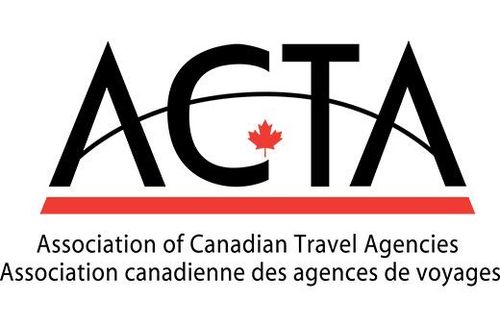Where travel agents earn, learn and save!
News / ACTA’s latest webinar on emergency financial assistance
Close to 1,000 registrants for ACTA’s latest webinar

ACTA President Wendy Paradis, introducing ACTA’s April 3 webinar updating retailers on new financial measures aimed at keeping the Canadian economy afloat amidst the coronavirus pandemic, says travel agencies “have already been hit with six months of revenue losses” and that the retail travel industry “will need help now and into the future.”
Some 90% of ACTA members are small businesses, with fewer than 99 employees. Small businesses are the backbone of the Canadian economy, and the travel industry, for that matter.
New emergency financial assistance programs including the Canadian Emergency Response Benefit (CERB), launched today by the federal government, are aimed at helping Canadians impacted by the coronavirus pandemic, while the 75% wage subsidy program is geared in particular to SMEs (small to medium-size businesses).
ACTA has been in contact with the federal government every day as the pandemic’s impact on the travel industry quickly took shape over the past several weeks. “Our goal is to ensure the voice of travel agents and travel agencies is represented and heard,” said Paradis in the April 3 webinar.
Because travel is booked so far in advance, the industry has lost not just bookings now but many months from now as well.“We’re sending a strong message to the federal government that the situation is critical,” says Paradis. “We need emergency financial aid. Also some 35% of agents in Canada are independent contractors (ICs) and this aid is also on the way. Travel agencies are seeing zero or close to zero revenue. Our message is that travel agency businesses need immediate infusions of cash.”
Weighing in on refunds and chargebacks, she noted that “all regulatory bodies say that future travel credits are acceptable in this unprecedented situation.”
The April 3 webinar, similar to ACTA’s March 19 webinar, featured guest speaker Corina Sibley, Managing Director, HR à la carte, with close to 1,000 webinar registrants. An archived copy of the April 3 webinar can also be found on ACTA’s website.
Canadian Emergency Response Benefit (CERB)
Launching April 6, the Canadian Emergency Response Benefit (CERB) provides temporary income support for Canadians who have stopped working because of the coronavirus pandemic.Applicants are asked to file their CERB applications by according to the month they were born (Mondays for January, February and March birthdays; Tuesdays for April, May and June birthdays; Wednesdays for July, August and September birthdays; and Thursdays for October, November and December birthdays).
Says Sibley: “If you’ve already applied for EI, then you don’t need to file again for CERB. IC’s are eligible for CERB too. CERB provides $2,000 per month for up to four months. In other words, $500 per week for up to 16 weeks. You have to reapply every four weeks. If you have lost income because of COVID-19, you are eligible. CERB applies to any wage earners – full time, ICs, contract and so on. CERB also applies to workers who are still employed but not receiving income.” The CERB site is here.
Canadian Emergency Wage Subsidy (CEWS)
Initially 10%, the federal government’s wage subsidy program is now 75% for qualifying businesses, for up to three months, retroactive to March 15. The program is available to any business with a 30% or more drop in revenues. The 30% can be calculated using year-over-year metrics (eg. March 2019 for a comparison with March 2020; April 2019 for a comparison with April 2020, etc).“You have to prove you paid your employees, and then you get a refund,” says Sibley, a measure designed to clamp down on any business owners who might try to take advantage of the program and use the emergency subsidy for anything other than employee wages.
Applications for CEWS can be done online via the Canada Revenue Agency’s My Business Account portal, however it’s not available yet. Sibley says the program should be up and running in three to six weeks.
Business Credit Availability Program (BCAP) and More
ACTA’S VP Advocacy, Heather Craig-Peddie, also touched base on a few financial programs, including BCAP and CEBA. BCAP, the Business Credit Availability Program, is extending an extra $65 billion in financial support to businesses. CEBA meanwhile, the Canadian Emergency Business Account, offers interest-free loans of up to $40,000 to small businesses.“These are programs that would normally take up to a year to launch, and they’re doing it within a matter of weeks,” says Craig-Peddie.
CEBA isn’t expected to roll out until after April 17 however Craig-Peddie says online CEBA applications may be accepted as early as this week. She advises agency owners to “work with your financial institution and sign up for online banking, and also get your 2019 T4 Summary of Remuneration ready in advance.”
Other measures include deferral of tax remittance, with the CRA allowing all businesses to defer payments of income tax amounts owing until August 31, 2020.
ACTA Resources and How to Help
ACTA’s website, includes a COVID-19 portal with all of the above financial information as well as archived webinars and more.Craig-Peddie says retailers can help ACTA achieve its goals by becoming ACTA members, donating to ACTA’s COVID-19 Emergency Advocacy Fund and continuing with the letter writing campaign. “More than 3,000 letters have been sent to date. Thank you. This is a very important grassroots measure,” says Craig-Peddie.
Source: Travelweek
More Travel News:
TIAC Tourism Advocacy Update
TICO has announced 90-day deferral of fees
Why Buy Travel Insurance?
Be Together. Be Intrepid.











